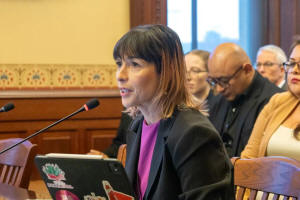House Dems eye taxes on entertainment, billionaires’ investments to fund
transit
[October 29, 2025]
By Ben Szalinski
SPRINGFIELD — Two key negotiators on public transit reform in the
Illinois House filed a bill Tuesday to raise up to $2 billion for public
transit by taxing entertainment and the unrealized investment gains of
billionaires.
Chicago area public transit agencies for months have argued that the new
funding is necessary to avert a funding shortfall and service cuts.
But even as Chicago Democrats Kam Buckner and Eva-Dina Delgado indicated
they believed the measure would pass in the House, it has a long way to
go before making it to Gov. JB Pritzker for consideration. The Senate
passed its own funding plan in May that included a controversial
per-package delivery fee, but it went nowhere in the House.
The future of Senate Bill 2111 in the Senate is not clear, however.
Delgado said the proposal represents what House Democrats think are the
best solutions to pay for public transportation. She said a tax on
rideshares, deliveries and real estate transfers that the Senate passed
in May were “definitely concerning” to House Democrats.
Sen. Ram Villivalam, D-Chicago, did not immediately respond to a request
for comment about the House’s proposal.
Buckner and Delgado said of the $1.5 billion and $2 billion that would
be raised, about $220 million would go to downstate transit agencies.
The bill would include a series of reforms similar to what the Senate
passed this spring to create a stronger oversight board in the region
and improve fare and schedule integration.

“We heard the characterization over the last three or four months that
this couldn’t be a Chicago bailout,” Buckner told Capitol News Illinois.
“So, No. 1, what is in this bill is very clear that it is a
transformative transit package for the entire state of Illinois. No. 2,
when you look at what we’re asking in order to get to that number … the
majority of the dollars are coming from the city of Chicago proper, and
then the collar counties.”
How it’s funded
The Regional Transportation Authority, Chicago Transit Agency, Metra
commuter rail and Pace Suburban Bus collectively face a $230 million
funding shortfall in 2026 as pandemic relief money runs out. The funding
deficit is projected to grow to $834 million in 2027 and $937 million in
2028. Without action in Springfield to plug that gap, the transit
agencies have said they could be forced to cut services by 40%.
The largest portion of funding — about $700 million — would come from a
7% statewide tax on entertainment ranging from streaming services to
live shows and other ticketed events.
“That would help us not only address issues in the northeastern Illinois
region, but also downstate transit agencies that are looking at some
possible cuts in the future if they don’t get some additional funding,”
Delgado told Capitol News Illinois.
The sponsors said a $5 surcharge would also be tacked onto ticket
purchases for large events and raise about $125 million. The surcharge
would apply statewide but would mostly be paid for by those attending
large events like concerts and sporting events in the Chicago area. The
charge would allow ticketholders to use their ticket to ride public
transportation to and from the event, Delgado said, with the goal being
to change people’s travel behavior to large events.
Buckner and Delgado said the measure would also tax billionaires on
unrealized gains on investment assets at a 4.95% rate — at the state’s
current income tax rate — to generate about $300 million.
“If you’re going to go to anybody for funds, why not go to those who are
most able to pay and making sure that those folks who have the means
will be able to contribute to the system,” Delgado said.

[to top of second column]
|

Rep. Eva-Dina Delgado, D-Chicago, speaks in an Illinois House
committee about a public transportation reform bill on May 31, 2025.
(Capitol News Illinois photo by Andrew Adams)

The existing sales tax imposed by the RTA in Cook County and the collars
would increase by 0.25 percentage points to 1.25% in Cook County and 1%
in the collars. And another estimated $266 million would come from
allowing municipalities to install speed cameras near churches, parks,
schools and hospitals. Municipalities would be allowed to keep half of
the revenue.
“A number of mayors around the state and village presidents have asked
if they could get the same ability that Chicago does have to put up
speed cameras,” Buckner said.
The plan is expected to face pushback from Republicans — and maybe some
Democrats — in both chambers who have worried about increasing the tax
burden on residents, especially those who don’t use the Chicago area’s
public transportation systems.
“Let’s reform the structures, let them get their arms around it, and
then let’s talk about what is needed” for funding, Senate Republican
Leader John Curran, R-Downers Grove, said at a news conference earlier
Tuesday.
New transit oversight
The reforms in the proposal are similar to what the Senate passed in
May.
The bill would create the Northern Illinois Transit Authority, which
would be a stronger version of the RTA and would have the ability to
establish a universal fare system and coordinate scheduling between the
three service agencies.
“Complete consolidation was going to be problematic for us and that we
knew that each of these agencies kind of had their own flavor, but it
was important that they were able to work together under one umbrella,”
Buckner said.
The board would be comprised of 20 members: five appointed by the mayor
of Chicago, five by the Cook County Board president, five by the
governor and five collectively by Lake, McHenry, DuPage, Kane and Will
counties. That makeup has drawn criticism from some suburban leaders who
fear it will limit their ability to affect public transportation
decisions.

It would also create a law enforcement task force that will target hot
spots for public safety issues on the transit systems. Other roles will
be tasked with deescalating conflicts or seeking to address homelessness
and mental illness – issues that can sometimes escalate into public
safety issues.
“Policing may be a part of that, but it is not the solution to
everything,” Delgado said. “So we have to look at what makes somebody
feel safe on the system. Part of it has to do with getting more people
on that system because when you’re in a full train, you feel pretty
safe.”
What’s in it for downstate
Transit agencies outside the Chicago area face their own funding
challenges as a formula in Illinois law that directs a portion of sales
tax revenue to downstate transit agencies becomes less lucrative. Those
agencies are estimated to need $200 million in new revenue.
Delgado said about $220 million of the new revenue would go to transit
agencies outside the Chicago area.
Capitol News Illinois is
a nonprofit, nonpartisan news service that distributes state government
coverage to hundreds of news outlets statewide. It is funded primarily
by the Illinois Press Foundation and the Robert R. McCormick Foundation. |